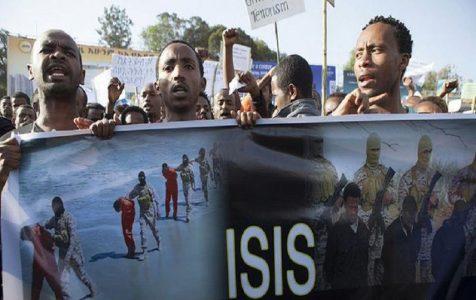
Islamic State terrorist group seeks new foothold in Africa
After the terrorist organization al Qaeda, now the so-called “Islamic State” is trying to expand its influence in Africa. Military means alone are not enough to fight it.
French President Emmanuel Macron found clear words on terrorism in Africa during his recent visit to Niger.
“The fight is not won today,” Macron said. Within the next few months, one thing was needed above all: “Clear victories for our armed forces against the terrorists.”
In Niger, as with most other countries in the region, few such successes can be claimed.
Jihadi forces have established footholds across the Sahel, in Chad, Mali, and indeed Niger. And the prospects of defeating them and neutralizing their ideology are far from good. At the very least, considerable efforts are required from French and other western troops, together with local forces, to rein in jihadism in the region.
Macron’s urgent focus on the next six months was no accident. That’s because the so-called Islamic State (IS) has recently lost large areas that it used to control in Iraq and Syria. Now it’s trying to make up for that lost ground elsewhere, including western Africa. IS fighters in Niger recently showed just how dangerous and combative they can be. Early in October, soldiers from the US and Niger clashed with militants associated with IS on the border with Mali. The battle claimed the lives of four US and five Nigerien troops.
IS “has aspirations to establish a larger presence” in Africa, according to US General Joseph Dunford. He said after the October attack that the US military would make recommendations to President Donald Trump and Defense Secretary Jim Mattis “for the allocation of forces that meet what we see as the threat, what we anticipate the threat to be.” Republican Senator Lindsey Graham found more blunt words: “The war is morphing. We’re going to see more actions in Africa, not less.”
The US has already stationed around 1,300 special forces troops in Africa. France has deployed 4,000 soldiers in the Sahel region to assist soldiers from Mali, Mauritania, Burkina Faso, Niger and Chad. Italy is also considering relocating troops from Iraq to Niger, at Macron’s request. Donor countries have so far collected around €300 million ($360 million) to help fund the missions. Another such fundraiser is planned for January in Saudi Arabia, followed by another in February in Brussels.
It’s not yet clear whether money or military aid will be enough to stop the expansion of jihadism in the region, or indeed to drive it back. The challenges facing the alliance are immense. Christophe Ayad, a Middle East and Africa analyst for French daily newspaper Le Monde, wrote in November: “Mali is our Afghanistan.” He said both countries were following similar patterns: first a military triumph, then a failed reconstruction and then a gradual spread of new insurrection, more brutal and more politically shrewd than the previous one.
Ayad said the reasons for this cycle were complex, and predicted that Western troops’ commitment to the mission would wane with time, not least because they’d start to lose trust in their local partners on the ground. “Local authorities on the other hand are being marginalized by their western protectors, who tell them what to do, even though they do not understand the local conditions such as how to deal with this clan, that tribe, this political group or that militia.” Meanwhile, the jihadis continue to spread.
Source: DW





